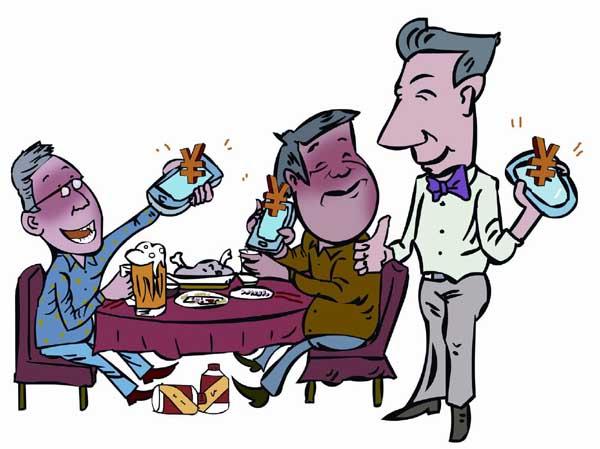Will App Tipping Help Improve Restaurant Service?
2016-05-14

Electronic “red envelope” fever has swept the country ever since WeChat, Chinas popular mobile chat application, allowed users to send monetary gifts through its online payment system to each other. Due to this system, which was launched more than two years ago, more and more consumers are now beginning to practice tipping in restaurants. If customers feel satisfied with the service provided by their waiter or waitress, they can send them a tip by scanning the restaurants WeChat identification code. Restaurants claim that this gives waiters an incentive to provide better service.
Tipping, or giving gratuities, is not a common practice in China, which is why this newly invented tipping system has roused some controversy, especially given the fact that some waiters demand that their patrons tip them. Some restaurants have already suspended the practice. While some people believe it can help improve restaurant service, others feel it is still unacceptable.
Unnecessary and unhelpful
Yu Haijun (news.cqnews.net): The WeChatbased tipping practice is quite innovative, as tips are not popular in China. The purpose of introducing this practice is to improve catering industry services. In reality, more and more people have expressed uncertainty and even opposition to the tipping system, which has prompted some restaurants to halt this practice.
Why is this WeChat-based tipping system encountering resistance? This tipping system seems to explore a new service, but to some extent, it is a means for restaurants to transfer some of their economic pressure to customers. For example, some restaurants may want to increase wages for their staff, but the cost of daily operations keeps increasing, so they try to achieve this goal by asking for tips through WeChat.
Tips are practiced in many countries with a view to ensuring good service quality, but this does not seem to be occurring in China. Many of those working in the catering industry in China have not received professional training, and restaurants that employ them may not have adequate quality management. Some restaurants expect tips to act as incentives for waiters to enhance their service. However, waiters can easily demand a gratuity regardless of whether or not their patrons feel like leaving a tip.
Tipping waiters also means that customers have to pay extra for meals. This added charge in most cases is unacceptable, particularly when the original bill, which supposedly includes service fees, is already high. After all, Chinese are not accustomed to this practice. Besides, consumers may have to scan a WeChat code and become a member the restaurant before tipping—something which some may consider an unnecessary hassle.
Restaurants need to avoid shifting their economic pressures to consumers. Instead they should make tangible efforts to improve their employees professional competence. People will naturally feel more inclined to pay tips when they find that a restaurants food is delicious and the environment is comfortable and convenient.
He Yong (Jianghuai Daily): The WeChatbased tipping system is not a bad thing in itself, and the tip tends to be a very small sum. Now, although tips are supposed to be given out of a customers own volition, it often happens that the tips are forced on him or her.
Regardless of whether or not consumers pay tips, they are entitled to good service. This is a basic obligation that restaurants should fulfill. There should be no difference in quality between those who pay a tip and those who dont. Restaurant staffs discrimination against consumers will drag down restaurants overall service quality.
Ren Chaoping (www.canyinj.com): The tipping-based incentive system may not play such an important role as some think in boosting restaurants profits. Improved service will not necessarily swiftly increase a restaurants revenue, nor can you expect a five-yuan ($0.7) tip to bring a radical change to waiters mindsets.
Nowadays, tipping is accepted chiefly because of the convenience of paying through WeChat. If the tips are given in cash, both consumers and waiters may feel embarrassed.
A good tipping system is supposed to act as a bridge between consumers and waiters, wherein both parties can take advantage of a positive feedback loop. Such a tipping system is what we want to see and what the catering industry in China hopes for.
He Yonghai (www.china.com.cn): Tipping has been picked up by some restaurants to boost their interaction with consumers. They use tipping and the amount given in tips to measure their waiters service quality. We wont pass judgment on the desire to stir up enthusiasm for work, but this kind of incentive may drive waiters to demand tips from their patrons instead of passively receiving them. Waiters eagerness for tips may finally hurt consumers rights and interests.
Most Chinese are not accustomed to tipping, and some may even reject this practice. As pointed out by many people, the payment of a certain meal already covers every item of expense, from food and waiters service to a restaurants basic operation costs. Restaurants have an obligation to provide quality service and they are not supposed to ask for extra payments.
Actually, tipping alone is unlikely to encourage waiters to try their best when providing service to consumers. I suggest that instead of demanding tips, waiters and waitresses ask patrons to give them a star or a “thumbs up” in some kind of recordkeeping system. The one who harvests the most praise could receive a reward from their employer. This avoids potentially awkward scenarios for customers, and waitersenthusiasm for their work can be enhanced. Restaurants that hope to attract more consumers and make more money should not rely on the so-called tipping system, they need to do better with things such as WiFi access and parking, apart from serving delicious food.
Give it some time
Long Minfei (guancha.gmw.cn): Customers only feel like giving a tip when they are satisfied. In this sense, tipping through WeChat will encourage restaurants to improve their service. However, on the whole, Chinese dont have the custom of tipping, and restaurants dont know how to deal with it well. Naturally, doubts regarding this practice have begun to increase. In some restaurants, tips are not given voluntarily but are asked for, which goes against the purpose of introducing this system to restaurants. Some restaurants may even see tips as another way to make a profit. As a result, some have called for the suspension of this practice.
A sweeping ban on this WeChat-based tipping system should not be enforced—we need to give it some time. Tipping is not a bad thing, and if its benefits can be brought into full play while mitigating its drawbacks, it will help to improve the overall quality of Chinas restaurants. It poses a challenge as well as an opportunity to restaurants. If consumers find the system unacceptable, they may choose to avoid having meals in places that support tipping. Nevertheless, if restaurants are able to make tipping more acceptable to their patrons, it will help to move those restaurants operations a step forward.
Simply put, this new tipping practice is a product of the market system, and its success depends on how it plays out in Chinas market environment. Its possible that consumers choices and demands will help to make a better tipping system that can interest all parties.
